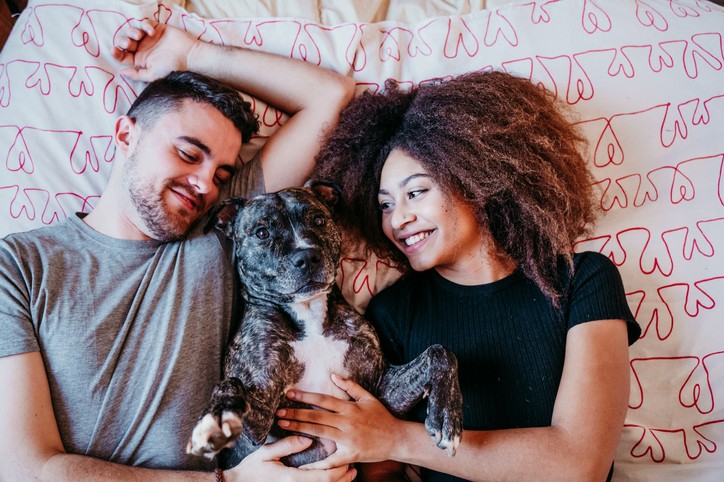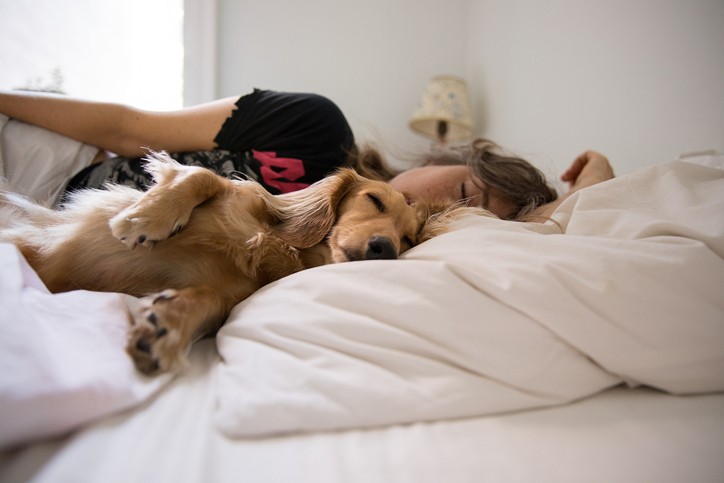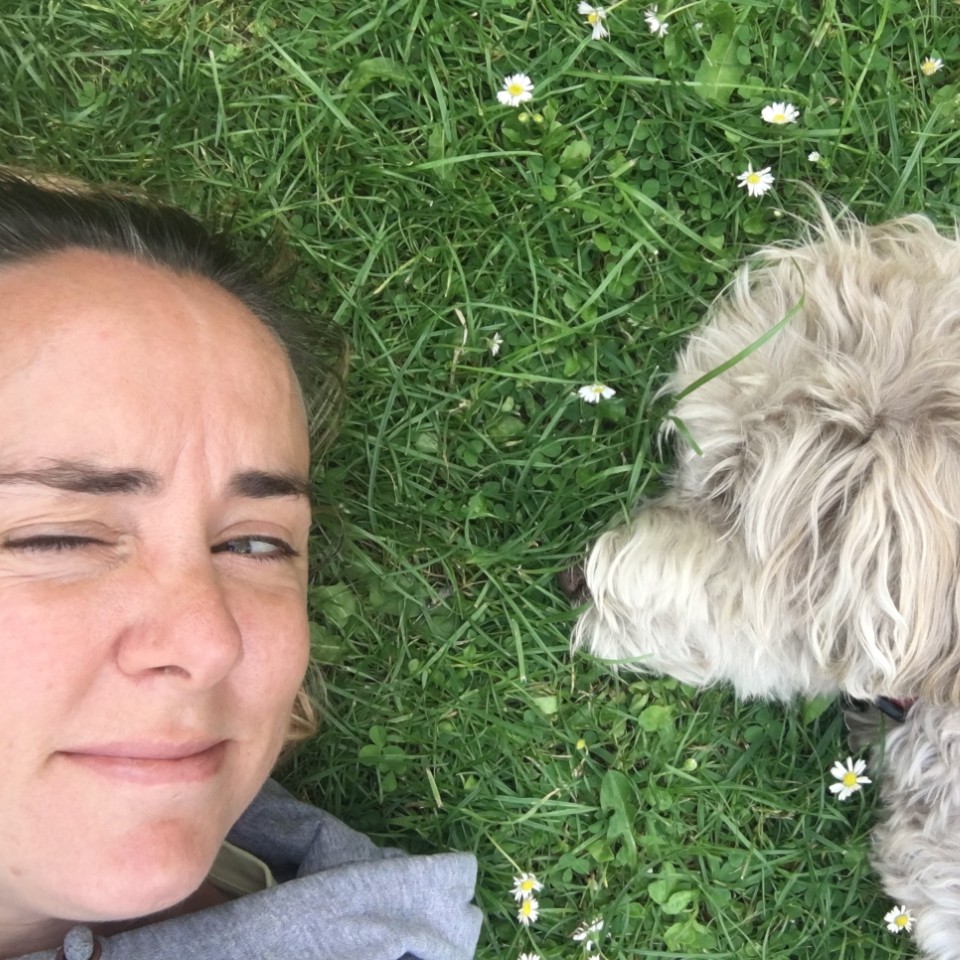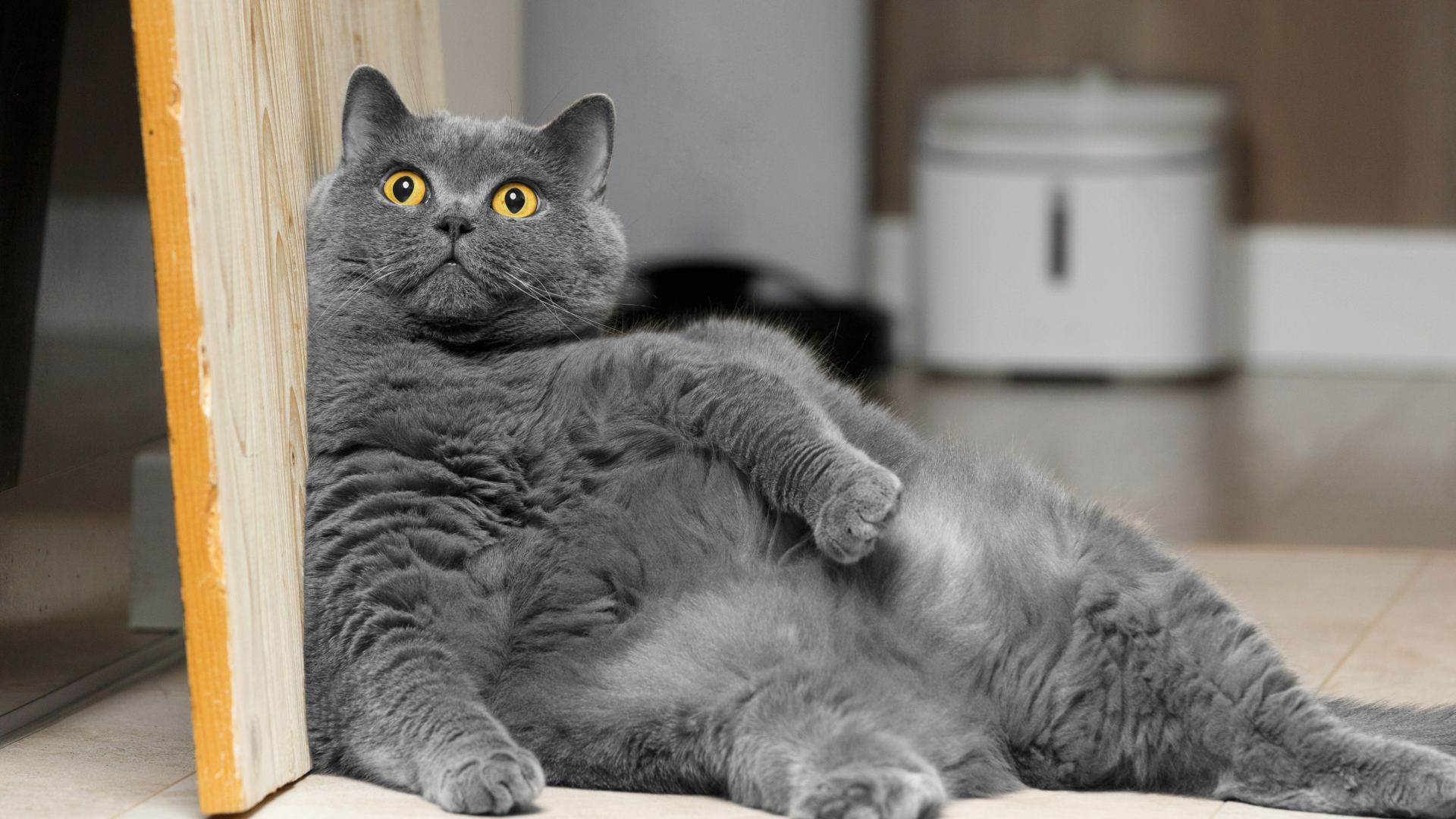Should your dog sleep in your bed?
“Should your dog sleep in your bed?” is a common canine conundrum – but one we’re going to help you figure out

The answer to the question, “Should your dog sleep in your bed?” depends on multiple factors, including a few obvious ones. How big is your dog? Letting your super-sized Great Dane slink onto the sheets won’t even be an option if your bed is a single one, while pint-sized pooches are more likely to be kept awake when you toss and turn, which means you’ll be forced cruelly from your slumber when your four-legged friend decides he’d rather sleep downstairs in the best dog bed that you could find for him, after all.
Remember that your dog is a dog, not a human
Other factors include the dog’s personality. In the same way that some humans are needier than others, some dogs rarely leave their owners’ sides, while others give us the impression that they’ll tolerate their owners’ presence only because it means they’ll get fed, watered, and walked. In other words? Start by taking the lead (excuse the pun) from your dog, and don’t, under any circumstances, force a dog to sleep in your room or on your bed if he’s happiest enjoying his own space. They’re pets, not hot water bottles, after all. However, if your dog is the type who sticks to your side like glue, barring him from the bedroom could do more harm than good.
“As long as both the owners and their pets are healthy, it is absolutely fine for dogs to sleep on their owner’s bed, and may even have a positive effect on quality of sleep for both,” points out Dr Jessica May, lead veterinarian for video vet service FirstVet. “The risk of falling off the bed can, of course, be significant for smaller dogs, but this sleeping arrangement is no longer considered to lead to behavioral issues.”
The most important thing to bear in mind is that your dog never forgets who’s in charge. If you allow him to sleep on your bed or in your bedroom, it’s essential that there are certain rules in place. Don’t allow him in the bedroom or on the bed when you’re not there (unless you want to risk him marking his territory on your designer bed linen), and if your dog reacts aggressively when you shift position or adjust the bed sheets, it’s time for a stern reminder that you’re the one in control. Avoid condoning this type of behavior by laughing it off or giving in.
However, it’s important not to underestimate the potential benefits of sleeping with your dog on the bed, or in the same room. “As dogs have become regarded more as family members rather than working companions, it's important to fulfill a dog’s natural pack instincts, including sleeping as a pack,” says Anna Webb, a dog behavior and nutrition expert, who has studied at the College of Integrative Veterinary Therapy. “We have become their packs, and dogs and their people both boost their oxytocin levels by being close to one another, which is one reason why dogs have helped out with mental health to such a huge extent throughout the pandemic.”

That said, bear in mind that having one set of rules for one area of the house, and another for a different area, can be confusing. Don’t expect your dog to politely hop off the bed with a single command if he’s spent his formative years curling up on his designated spot on the couch. Similarly, if you’ve never allowed him within a whisker of your prized antique armchair, don’t expect him to continue to stick to the rules if you suddenly decide he’s allowed on the bed. Any excuse you use for one-off rule breaks (whether it’s the fact that you’re feeling under the weather or your four-legged friend is recovering from a minor operation) will still be seen by your dog as a sign that previously banned behavior is suddenly okay.
Dogs’ inability to differentiate is the most important reason to stick rigidly to the rules. Dogs like boundaries, and they’re unable to make informed decisions in the way humans can, so it’s important to consider possible repercussions when deciding what your dog can or can’t do. For example, if you’ve got babies or very small children in the household, it might be worth making any bed and sofa a no-go zone from the outset – even the smallest dogs can easily pose a suffocation risk to babies and toddlers.
Remember that dogs sleep differently to humans
Another factor to consider is how soundly you sleep. Long story short, it’s almost certain that you sleep better than your dog. This is because dogs are polyphasic sleepers, which means they sleep in short bursts. Humans are monophasic sleepers, which means they enjoy one long (ideally interrupted) period of sleep every 24 hours. So if you’re a light sleeper, you could well find yourself being repeatedly disturbed whenever your dog wakes up. Dogs are also naturally programmed to stay alert for sounds, so while you might sleep blissfully through the night-time screech of a cat or a distant slamming door, your dog is much more likely to wake and react.
However, it’s important to remember that there are many benefits to allowing your dog to sleep on your bed, or in the same bedroom. The journal Human Nature recently published a paper titled, 'A Multispecies Approach to Co-Sleeping: Integrating Human-Animal Co-Sleeping Practices into Our Understanding of Human Sleep'. The authors pointed out that the issue of whether owners should let dogs sleep with them has only recently become a contentious one, thanks to a greater focus on the risks. But the authors add that in many cultures, sleeping alongside dogs has been the norm. For example, Aboriginal Australians traditionally sleep next to their dogs not only to keep warm, but because of the belief that their presence helped to ward off evil spirits.
In summary? If you’ve got a disciplined doggie who knows where the boundaries are, and there are no babies or toddlers at home, there’s nothing wrong with sharing your bedroom or your bed with your canine companion. And who knows? You might just keep those evil spirits at bay, too.
Wondering, 'Why does my dog lay on top of me?' Check out this feature.
PetsRadar Newsletter
Get the best advice, tips and top tech for your beloved Pets
Tamara Hinson is a freelance writer who grew up with huskies but unfortunately now has a husband who is allergic to dogs. Luckily she has a neighbour who lets her dog-sit her Maltese terrier and a nearby greyhound rescue centre where she can walk the residents.

